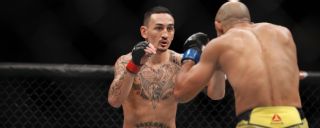|
Max Holloway has cemented himself as the undisputed UFC featherweight champion, ushering in a new era for the division with back-to-back victories over former champion Jose Aldo. In the main event of UFC 231 on Saturday night in Toronto, he looks to turn back a challenge from undefeated Brian Ortega. From a statistical perspective, Holloway should be considered a substantial favorite, but up to this point in his career, Ortega has continually prevailed despite being outperformed on the stat sheet. As we dig into the champion's statistical advantages, we'll also outline some possible paths to victory for the challenger. Striking differentialThere is a wide gulf between these two fighters in terms of striking. The disparity is illustrated best by striking differential, which is significant strikes landed per minute minus significant strikes absorbed per minute. Holloway currently has the second-best striking differential among ranked featherweights, with +2.30, behind only Alexander Volkanovski (+3.54). The champion lands the most significant strikes per minute among the same group, at 6.20, and he is slightly below average in terms of significant strikes absorbed per minute, at 3.90. In his past four fights, Holloway has been even more prolific offensively, landing 8.07 strikes per minute. On the other hand, Ortega ranks dead last among ranked featherweights when it comes to striking differential (-1.62) and significant strikes absorbed per minute (5.27). In fact, he is the only ranked featherweight with a negative striking differential -- and his differential is 115 percent worse than the second-lowest, Josh Emmett at +0.25. In his seven-fight UFC career, Ortega has had a positive striking differential in only one fight; he finished with a +0.14 differential against Thiago Tavares in 2015. Going off these numbers alone, it would be easy to predict a washout victory for Holloway. However, these metrics overlook the fact that, despite his shortcomings in the striking game, Ortega has never been defeated in the UFC. KnockdownsOne of the tools Ortega has used to score victories despite regularly being outlanded is his power striking. During his UFC career, he has averaged 0.66 knockdowns per 15 minutes and scored at least one knockdown in three of his seven fights. Although power striking is usually a viable path to victory for Ortega, Holloway has never been knocked down in 18 UFC fights. On top of that, trying to match power for power might not work against the champion. Holloway averages 0.56 knockdowns per 15 minutes, and he has knocked down two of his past three opponents. Ortega is unlikely to outland Holloway over the course of a 25-minute fight, but knocking down or stopping the champion will likely not be the easiest or safest endeavor. GrapplingAnother element of Ortega's successful run to a title shot has been his spectacular grappling ability. The Rener Gracie black belt has been credited with eight submission attempts, and he has earned three submission victories in his short UFC career. Holloway has also been successful in grappling, earning seven submission attempts and two submission victories while passing guard 18 times on the ground. Even with that kind of success, there might be some cause for concern for the champion -- areas Ortega can exploit. Holloway has allowed his opponents to register three submission attempts against him, and he fell via submission against Dustin Poirier in his UFC debut. Although he has been able to pass guard, he has also allowed his opponents to pass his guard 12 times. It's worth noting, however, that Holloway's defensive grappling has improved drastically as his career in the UFC has progressed, and he has not allowed a single guard pass since he lost to Conor McGregor in 2013. Although Ortega will likely have the upper hand in such a scenario, simply getting the champion on the ground might turn out to be a tough task. TakedownsDespite having above-average submission grappling skills, Ortega has not been able to impose his will by forcing his opponents into a ground battle. He scored a takedown in his UFC debut, but since then, Ortega has failed on all four of his attempts. Overall, he has landed just 14 percent of his takedown attempts in the UFC. Holloway had some issues defending takedowns early in his career, but it is safe to say that he solved that issue. In his UFC run, he has stopped 83 percent of his opponents' takedown attempts. His takedown defense has been even better in his recent performances; in his past 10 fights, Holloway's opponents have gone 1-for-37 on takedown attempts, and he has gone nine straight fights without allowing a takedown. The bottom line here is that while Ortega will try to bring the action to the ground, it is much more likely that Holloway will be able to keep this fight standing. Ortega has been able to score finishes despite being outperformed on the stat sheet thus far in his UFC career, and he'll have to continue that trend if he is to become UFC featherweight champion. If he can't, Holloway will likely continue his reign over the 145-pound division.
|

